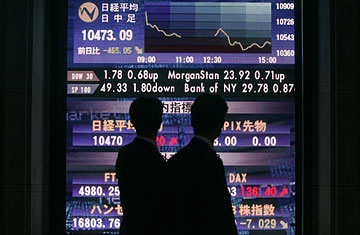
Men in Tokyo look at an electronic board displaying share price movements on Oct. 6, the day that Japan's Nikkei share average sank to a four-and-a-half-year closing low
For the most part, Asian banks have remained unscathed and economies relatively robust compared with other parts of the world. But tumbling Asian stock markets, marked on Monday by near-panic selling, is signaling just how little confidence there is among bankers and investors that the $700 billion bailout of U.S. banks will end the financial crisis.
Instead, worries are growing that a severe economic downturn in the U.S. and Europe could hurt export-driven Asian economies more than originally thought. Turmoil in Europe as governments scramble to cobble together their own bailout packages has convinced Asia that the contagion will spread far from Wall Street. "We felt pretty good that our economies are stronger," says Song Seng Wun, an economist at CIMB-GK Research in Singapore. "Problems seemed to be other people's problems." But recent events "have made us realize that we aren't entirely safe. It looks like the problem might be closer to home."
The specter of global recession helped spark Monday's plunge in Asian stocks as Hong Kong's main index fell 5%, Japan's 4.3% and Indonesia's 10%. Markets ended mixed on Tuesday: Japan's Nikkei index dropped 3% while Korea's Kospi and Singapore's Straits Times index both rose slightly. But few were heartened by the feeble bounces.
That's because credit markets, which affect the ability of businesses and governments to borrow to fund day-to-day operations, continue to tighten in Asia as banks become more nervous about lending. In Hong Kong, the one-month interbank lending rate has doubled in the past month to 4%. Central banks are trying to pump liquidity into financial markets to avert a credit crunch. India on Monday cut the amount of cash that banks must deposit with the central bank in an attempt to loosen credit. "Credit markets are quite global," says Kirby Daley, senior strategist at financial services firm Newedge Group in Hong Kong. "It is inescapable, if the credit crisis continues to worsen, that Asia must be affected."
Recent events in wealthy and relatively healthy Hong Kong show just how nervous Asians have become. On Oct. 2, shares of Hong Kong's Hang Seng Bank plunged 8.9% after word began circulating it could suffer losses related to the failure of Washington Mutual in the U.S. Hang Seng officials announced the bank holds senior debt securities issued by WaMu, but called its exposure "immaterial." In September, hundreds of depositors lined up at branches of Hong Kong's Bank of East Asia after false rumors spread that the bank was in financial trouble. The run was stemmed after the bank's management and the Hong Kong Monetary Authority made strong statements confirming the bank's financial strength.
With no end to the turmoil in sight, continued stress on Asian markets looks likely to continue. "We do not think the re-emergence of fear on account of the global financial crisis will likely evaporate anytime soon," Merrill Lynch commented in an Oct. 3 report. Once that fear sets in, it is hard to dispel.
